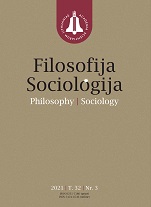Sunkiomis ir nepagydomomis ligomis sergančių asmenų orumas gyvenimo pabaigoje. Teorinės empirinių tyrimų prielaidos
Dignity of Severely and Terminally Ill Persons at the End of Life. Theoretical Framework for Empirical Research
Author(s): Jolanta Kuznecovienė, Gvidas Urbonas, Eimantas Peičius, Rūta Butkevičienė, Kristina AstromskėSubject(s): Metaphysics, Ethics / Practical Philosophy, Health and medicine and law, Philosophy of Law, Sociology of Law
Published by: Lietuvos mokslų akademijos leidykla
Keywords: dignity; autonomy; relational autonomy; care ethics approach;
Summary/Abstract: The content of the concept of dignity and its application in empirical health research is widely debated and there is no consensus on the issue. The aim of this article is to provide a theoretical framework for empirical research on the assessment of the dignity of people with severe and incurable diseases at the end of their lives. Although the results of qualitative research in various countries show that the concept of dignity significantly correlates with indicators of autonomy, we argue that even if a relational autonomy approach that, compared with the classic concept of authonomy, is more reliable, still it addresses individual self-determination as a core element. So, the relational autonomy perspective disregards individuals who have lost rational thinking skills. Therefore, in research on the dignity of people with severe and incurable diseases, autonomy can be considered as a necessary but not sufficient component of operationalization of the concept of dignity. In our view, the relational authonomy approach could be supplemented with the care ethic approach. It leads to de-universalization of care needs, takes into account sociocultural context, individual situatedness, etc. We argue that the relational perspective which integrates the care ethic approach enables researchers to reveal multivocality of dignity which must become a central premise of dignity research.
Journal: Filosofija. Sociologija
- Issue Year: 32/2021
- Issue No: 2
- Page Range: 169-176
- Page Count: 8
- Language: Lithuanian

